Syria air strikes: Will West's attack sway Syria's Assad?
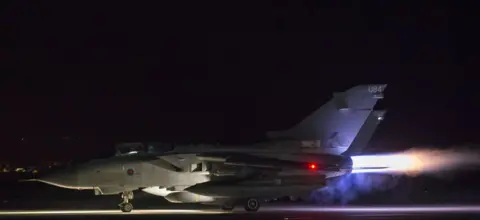 PA
PAThis was a heavier strike than a year ago - three targets rather than one.
Then, the US acted alone; this time it was joined by its French and British allies.
More than double the number of weapons were fired against Syrian targets than last year - a little more than 120 in all.
But the fundamental question remains the same.
Was this enough to achieve what the Americans say was their goal - to deter President Bashar al-Assad from using chemical weapons again?
Assad's effective victory
Since April a year ago Syria's torment has not ended. But two fundamental things have changed.
Firstly, the Assad regime has effectively won its war and terrorising civilians has played a key part in its strategy.
President Assad may not control all of Syrian territory. But backed by Russia and Iran, there is nobody that can really stand against him. It is shortages of manpower, equipment and capacity that prevent him re-establishing wider control.
 Reuters
ReutersSecondly, relations between Washington and Moscow - and between Russia and the West more generally - have deteriorated significantly, to the extent that senior international officials are now talking of a new Cold War.
This was the context in which President Trump determined to send his punitive message to the Assad regime. And this is the context in which they will have received it.
Will they be cowed or defiant? Will public bluster conceal a more fundamental re-think on the part of Mr Assad? Might Russia, whatever its spokesmen say, have a stern word with the Syrian leader? And if they did, would it have any effect?
Trump's distraction
Watching this crisis unfold from the United States, I found it both perplexing and in many ways worrying.
There seemed to be a lack of focus and clarity on the part of the Trump administration. Hardly surprising, perhaps, when the president himself was increasingly bogged down in his own domestic difficulties as allegations and recriminations about alleged past affairs and misbehaviour returned to haunt him.
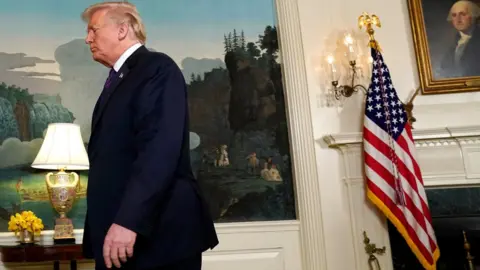 Reuters
ReutersAt times he seemed more likely to strike out at the US justice system than at President Assad. Indeed over the past week, while much of the rest of the world worried about what Mr Trump might do about Syria, the media here has been dominated, absorbed and fascinated, in equal measure, by Mr Trump's difficulties almost to the exclusion of all else.
President Trump's rhetoric suggested a major military strike against the Assad regime. In the event what has taken place falls far short of that. So what conclusion might Moscow and Damascus draw?
Soft targets
The Pentagon seems to have gone out of its way to avoid both civilian and "foreign" casualties - for that read "Russians".
The three targets hit were chosen both for their central role in the chemical weapons programme but also because the risk of collateral damage was smallest.
The Chairman of the Joint Chiefs of Staff noted at a subsequent briefing that the US had a list of other targets which it did not choose to strike this time. The clear message is that if the Assad regime resorts to chemical weapons again then more strikes will follow.
But again, since last April there have been a number of other alleged chemical weapons attacks, generally using chlorine gas. But until now the US did not strike again. So what message did this send?
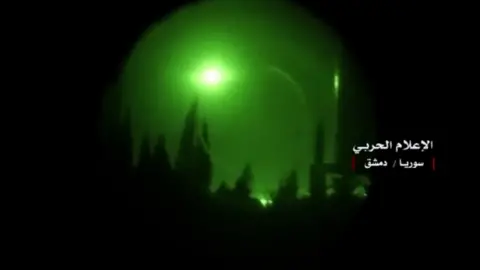 AFP / Syrian governement
AFP / Syrian governementNow the hope is that Mr Assad will change his behaviour. But what about the wider Syrian conflict? This brutal war shows no sign of ending. Many have pointed out that it is barrel bombs, artillery and bullets that are responsible for the overwhelming bulk of the deaths and mutilations in Syria, not chemical weapons, and yet it is these that prompt Western action.
There is a good measure of truth in this sentiment, though for historical and cultural reasons chemical weapons have a particular horror in the West in the wake of their use in World War One. The treaty banning them is an important disarmament agreement and its weakening threatens to unwind years of progress.
But the wider question is to what extent these latest strikes change the picture in Syria? Do they bring the conflict any closer to an end? Sadly the answer is almost certainly no.
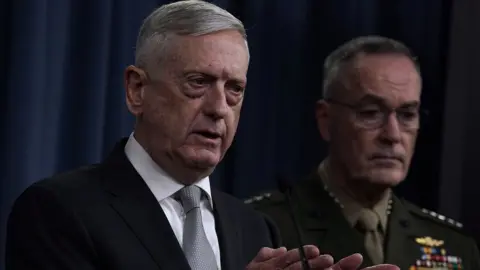 Getty Images
Getty ImagesOnly a short while ago - much to his generals' horror - Mr Trump spoke about pulling all US troops out of Syria. Only days later he seemed to be threatening a major military intervention. There has been no consistency in the Trump administration's position.
There is simply no clear strategy to help bring the war to an end. Indeed one of the arguments for keeping US troops in Syria to bolster their local allies like the Kurds, was in fact to keep the Assad regime and its Iranian backers off-balance.
Constraining Iran is about the only unifying theme in the Trump administration's approach, but even this has not been raised to the level of a coherent strategy. In his statement after the strikes the President again asserted that the US was not seeking an indefinite presence in Syria.
His hope was clearly that as others shouldered the burden (who?) the US might walk away. But this was followed by a catch-all statement about the intractability of the region and its problems, which hardly suggests a desire for a long-term engagement.
If these are the signals coming from Washington, then why should Russia worry?
Russia's rise
It has, through its military, and political support for the Assad regime, re-established itself as a significant diplomatic actor in the region. Russia, of course warned the US and its allies not to strike Syria. So in the wake of this attack what might Russia do?
In Syria itself, it might seek to further undermine Washington's already weak position but it is not going to war with the Americans - such fears, barring some extraordinary disaster, were always, probably, far-fetched.
US Defence Secretary James Mattis has already hinted at Russia's likely response noting that "we fully expect a significant disinformation campaign over the coming days by those who have aligned themselves with the Assad regime".
Indeed this campaign has in many ways already begun, with the Russians - who now have forces in the area where the recent chemical attack is alleged to have occurred - insisting first that there was no sign of a chemical attack and then, more recently, that the whole thing was staged by foreign agents to discredit Mr Assad and Moscow.
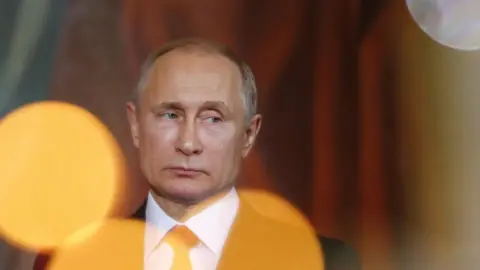 Reuters
ReutersThis is the same Russia that is accepted by most Western governments to have been behind the attempted assassination of a former Russian intelligence officer and his daughter in the English city of Salisbury, using a nerve agent. It is the same Russia that has tried to influence the US and other recent elections. It is President Putin's Russia that has seized part of Ukraine. One could go on. The misinformation battle has already been joined.
The new Cold War
There is indeed a new sort of Cold War developing. It may not risk nuclear annihilation, but because of that it is in many ways more direct and unpredictable, with Moscow taking much greater risks than it might have done in the past.
Russia is not a global superpower like the Soviet Union. It no longer has an ideology that gathers support from liberation movements around the world. It is fundamentally a middle-ranking regional power with a significant nuclear arsenal and a relatively weak economy. But it knows how to wield influence and how to conduct information warfare. And Mr Putin is determined to defend Russia's interests - as he sees them - wherever he is able.
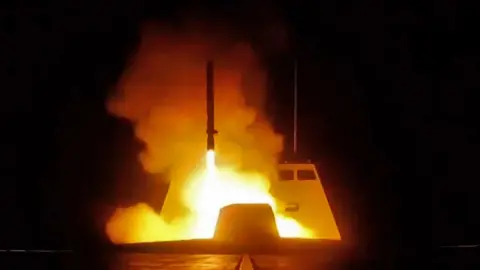 AFP
AFPMostly this means in Russia's near-abroad, that is countries close to its borders that have been traditional Russian spheres of interest - such as Georgia or Ukraine. Syria is almost an honorary member of the near-abroad, affording Russia an entry point to regain its influence in a region that still matters. Russia's star is rising and Washington's influence is in many ways on the wane.
And this matters. For instability in the region is growing. The ripples from a previous US administration's decision to remove Saddam Hussein's regime in Iraq are still spreading. Iran was the principal benefactor of that decision. It has become a formidable regional player.
Its growing influence in Syria risks a major conflict with Israel. Recently, Israel is believed to have struck at a Syrian base which was home to an Iranian facility.
Tensions are rising. The region's many fault-lines risk merging.
And the US, British and French attacks over-night have inevitably thrown another pebble into the pool.
